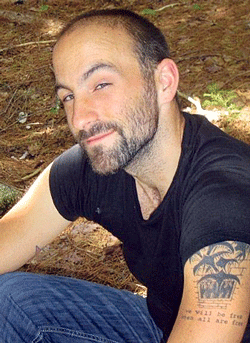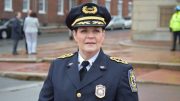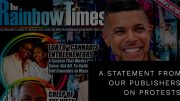By: Jason Lydon*/TRT Columnist–
While adorably, if not gratuitously, smooching my boyfriend outside against a business’ wall in the middle of the day, I paused and asked him, “What happened to public gay sex and sexuality in Boston? Public sex is supposed to be one of the fun parts of being gay.” His response illuminated an important distinction in sexual identity and culture. “Public sex, Boo,” he responded, “is part of queer sexuality and many, many gay people are anything but queer.”
Desire by men who have sex with men to have a quick hook up or a “no-strings-attached” fling has not decreased as same-sex marriage certificates get filed at city hall. What has changed is where men are finding each other. I look around at a gay bar, walk around on the streets, or peer at men in a coffee shop, and so many are scrolling down images of men on Scruff, Grindr, A4A, Growlr, or even posting on Craigslist to get what they might have gotten in a bathroom in the Boston Public Library. Yet when we stumble upon each other in public, unintentionally, there seems to be a shameful glance away, rather than a knowing grin and quick hello. So many of us are ashamed of our desires.
I recognize that I do not know enough about the history and culture of same-sex sexual expression of women in public spaces. I know of a few hot tubs in San Francisco, a story of a hot spot in MattildaBernstein Sycamore’s“That’s Revolting: Queer Strategies for Resisting Assimilation,” but my knowledge is not extensive. Legacies of patriarchy and objectification of women for men’s sexual consumption hides stories behind closets, under gravestones and in coded letters still unknown to me. I look forward to continuing to learn these pieces and would love ideas of where to look if readers have direction.
I was recently asking some gay men I know in Boston, who have been around quite a bit longer than me, where the cruising spots had been. Most of us already know about the Fens, and I have written in the past about the impact policing has in that area. I did not know about “The Block” in Back Bay revolving around Marlborough Street. I have many times been biking toward the Common on Marlborough Street from Mass Avenue and found myself quite annoyed that the street all of a sudden becomes one-way for only a single block. This piece of the street has not always been one-way however. Throughout the 1970s this was a busy cruising spot both to pick up sex workers and also to cruise for free. Men in cars would drive down Marlborough Street, take a right on Commonwealth, a right again on Berkeley and then drive down Marlborough Street again until they could pick up a guy of their liking. Sadly as the neighborhood became more bourgeois, residents organized to shut down the cruising and pressured the city to make the block one-way and increase policing.
Many parts of the white, middle-class, professional, able-bodied, privileged gay, lesbian, bisexual and transgender communities thrive on a push for legitimacy and systemic acceptance. These efforts like to leave stories of public sex in the past. Queer sex and queer sexuality, however, refuse to go away. We need not exchange wedding rings to display our public relationships, cruising in parks/alleyways/dark corridors is not simply a sign of cultural repression, rather it can be fiercely fun opportunities for fooling around. Queer sex/uality pushes the boundaries of what is acceptable, there is no reason to be ashamed of our bodies experiencing pleasure. Queer sexuality simultaneously recognizes that public sex can be fun, kinky and liberatory and/or a consequence of not having a home or a safe indoor place to be a sexual person. The political nature of queer sexuality then calls us to work toward a sexual culture that affirms desire and also knows that healthy sexuality means a safe home, stable food source and freedom from (non-consensual) forms of domination.
Understanding history and linking queer struggle to public sex is important when just two months ago City Councilor Frank Baker led a public meeting about sex work on Dorchester Avenue without including advocacy groups that support sex workers. The connections between public sex and commercial sex are key to understand, and when we allow people to be complex sexual creatures, we can find ourselves aligning with struggles for justice and boundary pushing. Personally, not only do I intend to keep learning the history I will also be looking for corners or greenery to sneak over to as I enjoy one of the best parts about being queer.
*Rev. Jason Lydon is a Unitarian Universalist minister in Boston. He is a long time anti-prison organizer and founder of Black & Pink, an LGBTQ-focused effort working toward the abolition of the prison industrial complex. Jason is also an avid lover of famous people and blockbuster action flicks. You can reach Jason at jason@blackandpink.org.








